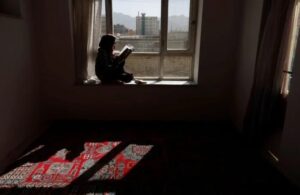KABUL (SW) – She was sitting in quite little corner, entirely focused on reading her book in a desperate hope, waiting for the school’s door to be opened amid grim uncertainties.
When approached, she greeted me with a childlike smile, introducing herself as 12-yers old Bahar, a sixth-grade student from Kabul. As the academic year comes to a close, she feels a sense of hopelessness, urging the de-facto government not to hinder girls’ education.
Bahar describes her life as having taken on a “fall-like” hue, filled with tears. Her greatest childhood wish is to “stop time,” as she fears losing her pencils, notebooks, and the dreams she harbors. “With each passing day, I feel sadder and cry more,” she shares. “If I had the power, I would pause these days to prevent my school year from ending. Although I am a top student, I am willing to accept failure this year, just so I can continue my education next year.”
Her love for school, classmates, and teachers is profound; she wishes she could attend even on Fridays. Yet, speaking about her impending absence brings tears to her eyes, as she wonders how she will fill the void left by her school. “Nothing can replace school in my life,” she says. “As each day passes, my heart breaks more. I love my teachers like my mother and cherish my classmates deeply. The thought of being away from them makes me cry.”
Bahar has big dreams; she aspires to become a doctor to help her fellow citizens. “If I can attend school and university, I want to serve my people as a doctor,” she states confidently.
Holding Bahar’s hand, I felt compelled to meet her father, who faces economic challenges that make life difficult. Despite these hardships, he promises to enroll her in language courses after she finishes school.
“Every day, I see Bahar wilting before my eyes,” he says. “I promised her that after the new year, I would enroll her in language and computer courses. But so far, no one has even offered me a loan. I must find a way to pay for her courses, despite my struggles. Even though I named her Bahar, I watch her wither away, and I fear she may fall into depression.”
While girls above sixth grade are currently barred from attending school by the de0facto government, women’s rights activists warn that the ongoing closure of educational institutions for girls in Afghanistan has dire and long-term consequences.
Hosna Raufi, a women’s rights activist, emphasizes, “Each moment of depriving women of education has a profoundly negative impact on their mental health, increases forced marriages, and will adversely affect the family economy, the societal economy, and ultimately the future of Afghanistan. It will lead to serious regression.”
Ahmad Rashed Sediqi, a university professor and social issues expert, agrees that the closure of schools for girls will have detrimental effects on society. “If schools and universities remain closed to girls, we will suffer in every aspect of society. Our family dynamics and political, social, and economic issues will deteriorate. Therefore, girls must be allowed to pursue education so they can contribute as citizens to the advancement of society,” he said.
According to United Nations International Children’s Emergency Fund (UNICEF), three billion hours of educational time have been lost in Afghanistan over the past three years, affecting 1.4 million Afghan girls due to current educational bans.
Since regaining power in 2021, the de-facto Islamic Emirate government issued a decree stating that schools would remain closed to girls above sixth grade until further notice. More than three years later, there is still no news of reopening secondary and higher education for girls.






